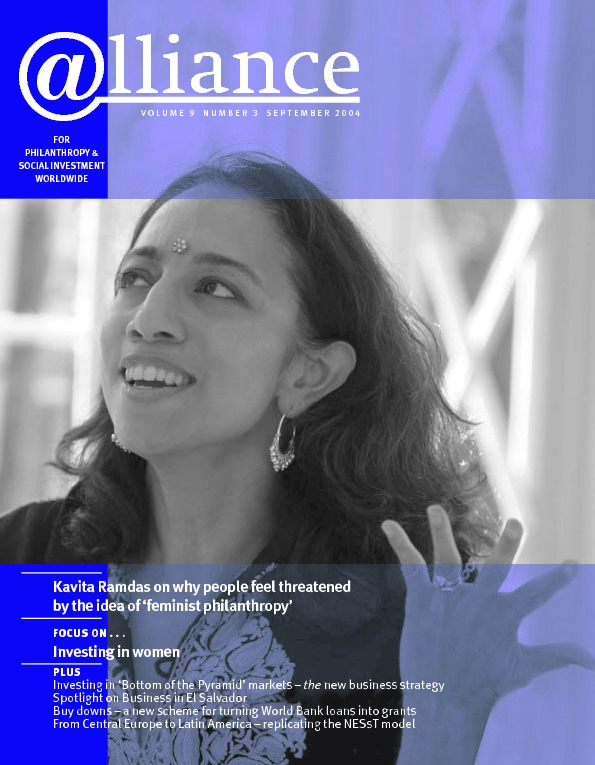As the Balkan countries move away from being zones of conflict and post-conflict towards stability and democratic consolidation, so some private and public funders have moved away from the Balkans to regions of greater need. But others, in particular some bilateral donors and the European Union, remain steadfast in their support. The Balkan Trust for Democracy, now one year old, is a partnership between some of the key funders that have remained. What has it achieved so far?
The Balkan Trust, which opened its office in Belgrade in June 2003, is a ten-year funding project of the German Marshall Fund of the United States (GMF), in partnership with the United States Agency for International Development (USAID) and the Charles Stewart Mott Foundation. It is a $27 million grantmaking initiative to support good governance in South East Europe. In addition, the Dutch Government has recently contributed €500,000 and the Greek Government has pledged €750,000 over a three-year period. Several other European donors have expressed interest in supporting its activities.
The Balkan Trust works in the Western Balkans, Romania and Bulgaria. Its aim is to strengthen democratic political institutions through two main programmes:
Linking Citizens with Government – supporting local and national organizations working to improve citizen engagement with government, monitoring government performance, and improving citizens’ understanding of their rights and responsibilities.
Cooperation and Collaboration – supporting sub-national and trans-Balkan collaboration among governments, NGOs, civic initiatives, and other institutions working to improve understanding and cooperation throughout the region.
The first year
The Balkan Trust has so far funded 60 projects. These include a grant to Most (Skopje) to create an NGO-Parliament liaison office in Macedonia; a grant to the Balkan Community Initiatives Fund (Belgrade) to help citizens of Serbia and Montenegro develop skills for the sustainable development of their communities, utilizing existing local resources; a grant to MJAFT Movement (Albania) to train community leaders, civic activists and concerned citizens, and to set up local civic clubs in 11 communities around Albania; and a grant to Women Activist Cross-border Actions (Sarajevo) for Balkan-wide activities with local organizations fostering greater social and civic participation.
The Balkan Trust has a small staff but they have sought and incorporated expertise from a variety of other organizations both inside and beyond the region. An Advisory Board of experts from South East Europe and from key international organizations has been charged with oversight of the institution’s strategic development. Partner institutions, along with GMF staff, are also part of the grantmaking committee, which considers grants on a rolling basis.[1]
This has been a pilot year for the Balkan Trust, and the initial feedback in the region has been very positive. The next step will be to conduct an initial round of monitoring and evaluation of the first projects to be completed. Here again, cooperation and the exchange of views and information with other donors will play a vital part.
The bigger picture
Balkan Trust staff have made numerous contacts with key institutions involved in international policy-making related to the region – such as the EU, OSCE,[2] government departments and the development aid agencies of a number of countries active in the region. Apart from the funding it brings, the Trust highlights the need for a continued donor presence to support the efforts of CSOs in the creation of stable democratic institutions. These will be crucial as the region moves towards integration with the EU and with the transatlantic community. The establishment of the Trust is evidence that international donors are also committed to this course.
There is no complacency about the difficulties and challenges that lie ahead. Creating a democratic political culture does not happen overnight. It will be the concerted work of citizens, governments, NGOs and donors. The last 13 years have seen successes, failures and wasted opportunities. With a conscientious and responsible approach, civic initiatives can profit from this experience to increase their stability and stature, from the local to the regional level, even with the limited resources at their disposal. The Balkan Trust is one among many actors, but it is here to humbly help those who want to help themselves.
There is no magic wand. It is only the daily renewed painstaking work of individuals and institutions that enables a society to move towards prosperity and stability.
1 Balkan Trust staff are themselves GMF staff, but other GMF staff also take part in the grantmaking committee.
2 Organization for Security and Co-operation in Europe.
Ivan Vejvoda is executive director of the Balkan Trust for Democracy. He can be contacted at IVejvoda@gmfus.org
See http://www.gmfus.org/balkantrust






Comments (0)